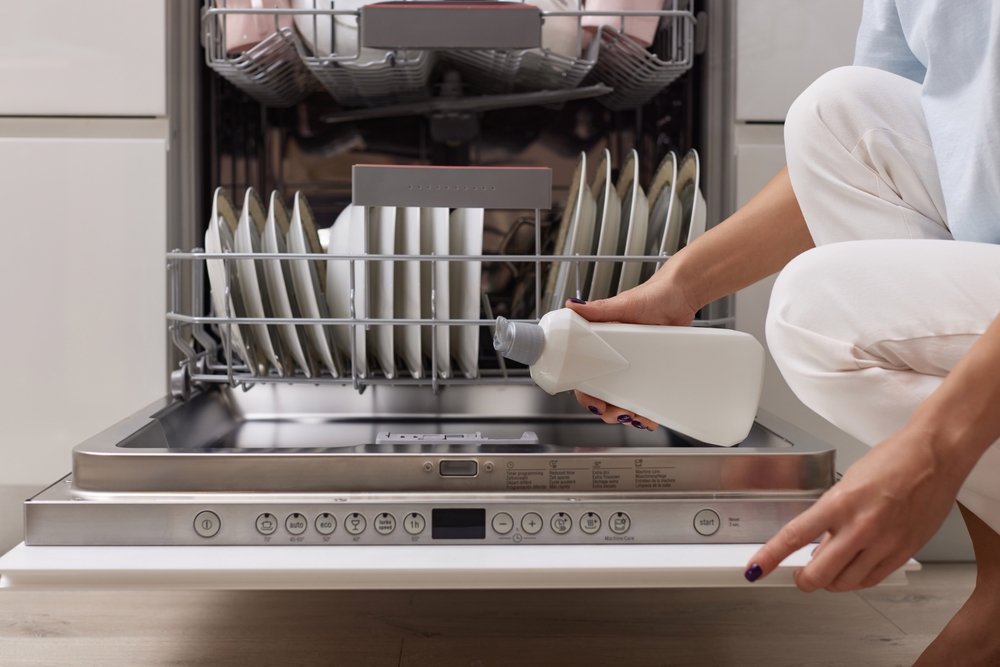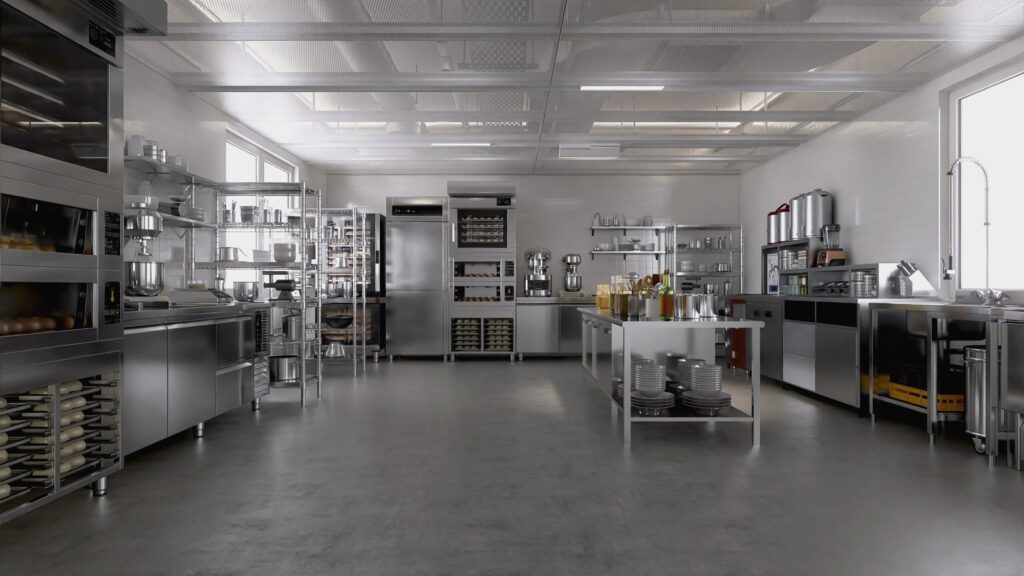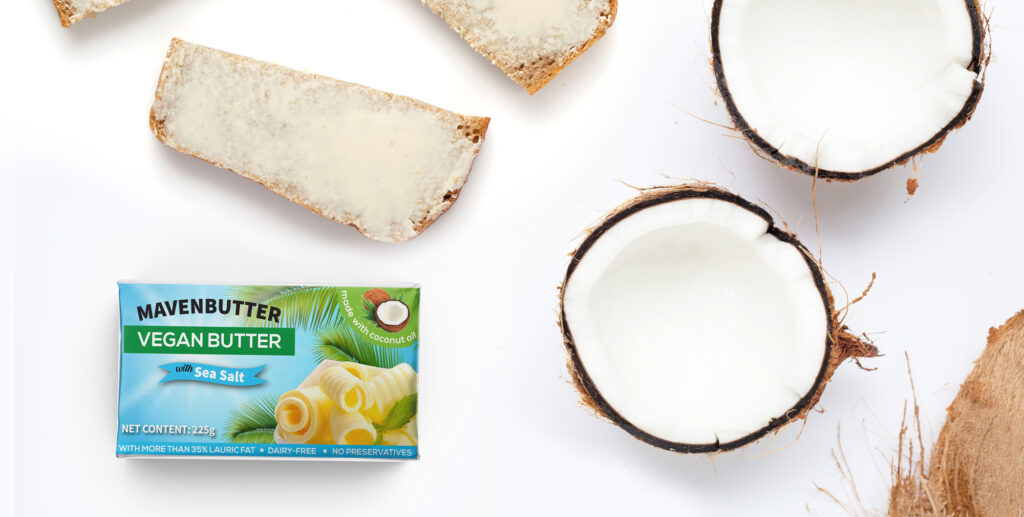Maintaining a clean kitchen is non-negotiable in the food industry. How often a commercial kitchen should be deep cleaned is a question of both hygiene and safety. While daily cleaning keeps surfaces tidy, deep cleaning involves more thorough sanitation of hard-to-reach areas and equipment interiors.
Knowing when and how often to schedule a deep clean—along with when an urgent one is necessary—can make all the difference in preventing issues and keeping your kitchen running at its best.
Why Is It Important to Deep Clean a Commercial Kitchen?
Before planning how often your professional kitchen should be deep cleaned, it’s equally important to understand why deep cleaning is important.
Deep cleaning ensures your establishment maintains the highest hygiene and safety standards by:
- Targeting hidden grease and grime: Grease traps, ventilation systems, and behind heavy equipment like stoves need heavy-duty cleaning. Parts like fryer baskets, oven grates, and fridge seals should also be cleaned to remove buildup that could harbor bacteria.
- Extending equipment life: Appliances perform better and last longer when they’re protected from grease-related wear and tear. Clean ventilation systems and grease-free hoods also reduce fire risks.
- Preventing health and safety risks: Thorough cleaning minimizes bacteria, reducing the chance of foodborne illnesses. Removing food debris and grease buildup also makes your kitchen less appealing to pests.
- Specialized cleaning products: Industrial degreasers for tough grease, food-safe sanitizers for prep surfaces, and heavy-duty floor cleaners from a trusted cleaning products manufacturer ensure efficient and thorough results, reducing contamination risks and improving safety.
By prioritizing deep cleaning, commercial kitchens can create a safe environment, extend equipment lifespan, and maintain food safety standards—all crucial for running a successful operation.
How Often Should a Commercial Kitchen Be Deep Cleaned?
Now that the importance of deep cleaning is clear, how often should a deep clean in the kitchen take place, and what tasks are involved? Let’s break it down into daily, weekly, monthly, and semi-annual tasks to keep your kitchen in top shape.
Daily
Daily cleaning ensures your kitchen remains sanitary and ready for the next service. These tasks focus on areas that experience the most use and high-touch surfaces:
- Surfaces and Prep Areas: Wipe down counters, chopping boards, and food prep tables to eliminate spills and bacteria.
- Cooking Equipment: Clean grills, stovetops, and deep-fat fryers to remove grease buildup.
- Small Appliances: Descale coffee machines, clean microwaves, meat slicers, and toasters. Sanitize dish racks and trays.
- Refrigerators, Switches Storage Units: Sanitize handles, seals, shelves, and other high-touch areas like switches to maintain food safety standards.
- Walls, Floors, and Drains: Sweep, mop, and disinfect floors, paying extra attention to drains to prevent clogs. Degrease grout lines, and remove food debris from tiles and walls.
- Utensils and Dishes: Wash all cookware, tableware, and glassware, and ensure dishwasher filters are clear.
- Sinks: Clean sinks and drains daily to prevent bacteria buildup and reduce the risk of cross-contamination during food preparation.
- Trash Bins: Empty, clean, and disinfect waste and recycling bins daily.
Weekly
Knowing how often to deep clean kitchen spaces can involve several schedules. Weekly deep cleaning targets less visible areas and equipment to ensure operational efficiency and prevent long-term buildup.
- Heavy Equipment: Thoroughly clean ovens, grills, fryers, and stovetops, focusing on grease traps and hard-to-reach areas.
- Ventilation Systems: Wash hood filters, ducts, and fans to prevent fire risks and maintain air quality.
- Storage Areas: Empty and disinfect refrigerators, freezers, and food storage spaces, disposing of expired items.
- Walls, Ceilings, and Windows: Remove splatters, grease stains, and food debris to maintain an inviting kitchen environment.
- Pest Prevention: Inspect storage areas for signs of pests, such as droppings or damaged containers, surfaces, or appliances, and take corrective action if needed.
Monthly
Monthly cleaning involves a deeper dive into equipment and surfaces to maintain optimal safety and cleanliness.
- Behind Large Appliances: Clean, and disinfect fridges, freezers, ovens, and ranges, focusing on grease buildup. Clean behind stoves, fryers, and other large appliances to tackle hidden dirt.
- Extractor Fans and Ventilation Units: Conduct a thorough cleaning to remove grease and dust.
- Dishwashers and Ice Machines: Empty and sanitize machines to prevent mold or bacterial growth.

Every Six Months
Semi-annual cleaning focuses on safety checks, emphasizing when to deep clean kitchen spaces to maintain compliance and operational safety.
- Fire Safety Systems: Inspect fire alarms, extinguishers, and suppression systems to ensure they’re functioning properly.
- Hood and Vent Cleaning: Conduct a professional deep cleaning of ventilation systems to eliminate grease buildup and reduce fire hazards.
- Gas Equipment Maintenance: Clean pilot lights and inspect gas lines to ensure safe operation.
Regularly following this schedule will help you maintain a safe and efficient commercial kitchen, ensuring the satisfaction of both customers and health inspectors.
When Is Emergency Deep Cleaning of the Kitchen Necessary?
Even with routine cleaning schedules in place, certain situations call for urgent deep cleaning in commercial kitchens. These emergencies not only impact food safety but can also affect a kitchen’s efficiency and reputation. Here are some common scenarios that might require immediate action.
Equipment Failures and Spills
Equipment malfunctions, such as a broken refrigerator or oven, can lead to food spoilage and spills that demand immediate attention. When perishable items are exposed to unsafe temperatures, bacteria can grow rapidly, increasing the risk of contamination.
Knowing when to deep clean the kitchen is essential in such cases to ensure all affected areas are sanitized. Additionally, addressing spills immediately can prevent stains, odors, and the buildup of harmful bacteria on floors and surfaces, maintaining a hygienic workspace.
Pest Infestations
Pests pose serious health and safety concerns in any kitchen. Signs of infestation, such as droppings, damaged food packaging, or actual sightings of rodents or insects, indicate the need for an emergency deep clean.
This involves sanitizing all food storage and preparation areas to remove any traces of contamination. Sealing entry points like cracks and holes is equally important to prevent pests from returning. Partnering with a professional pest control service is often the most effective way to handle such situations and prevent long-term issues.
Food Safety Incidents
Cross-contamination, improper food storage, or the use of expired ingredients can compromise food safety and lead to potential health risks. In these cases, knowing when to deep clean the kitchen is crucial to eliminate hazards.
This includes cleaning all food preparation surfaces, utensils, and high-touch areas to restore a safe cooking environment. Addressing such incidents quickly can prevent further contamination and protect both customers and staff.
Post-Event Recovery
Large-scale events or catering jobs can overwhelm even the most organized kitchens. The increased food preparation often results in grease buildup, cluttered workspaces, and overlooked cleaning tasks.
A post-event deep clean helps restore order by thoroughly sanitizing cooking equipment, emptying and cleaning storage areas, and removing any accumulated debris. This ensures the kitchen is ready for regular operations.
Health Inspection Failures
Failing a health inspection is a serious matter that requires immediate action. A deep clean in neglected areas such as ventilation systems, grease traps, and hidden corners can address identified issues. This is also an opportunity to review and enhance cleaning protocols to ensure future compliance with health and safety regulations.

How Often You Deep Clean Your Kitchen Matters
Knowing when to deep clean kitchen areas isn’t just another task on your to-do list. It’s a key part of keeping your business safe, efficient, and trusted by customers. Regular deep cleaning helps prevent food contamination, extends the life of your equipment, and keeps your kitchen in line with health regulations.
A spotless kitchen also shows customers that you care about quality at every level. By staying consistent with scheduled deep cleans and acting fast in emergencies, you protect your reputation and create a safer, more efficient space for your team.



